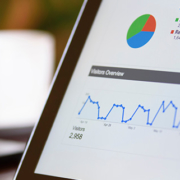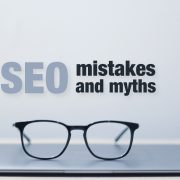8 Important SEO KPIs That Deserve Your Attention
If you’re looking for digital marketing success, you’re likely aware of how important search engine optimization (SEO) is. It’s equally important to monitor your SEO performance and determine the success of your marketing efforts. You should monitor a few key performance indicators (KPIs) to determine your SEO strategy’s strengths and weaknesses.
SEO KPIs can give you a clear picture of the number of visitors directed to your website thanks to your placement on the search engine results pages (SERPs) and what keywords you ranking highly in. They can also show you the number of conversions produced by your SEO strategy and the number of pages that are providing a positive (or negative) user experience by monitoring user engagement and page speed. Without monitoring these metrics, you leave yourself open to weak points in your SEO that could be hurting your performance.
To truly get the most return on investment (ROI) from your digital marketing, you need to keep track of your SEO success rates. Here are eight of the most important SEO KPIs, plus a list of SEO tools that can help you collect and measure the metrics.
1. Organic Traffic
Organic traffic refers to page views coming from search queries on Google, Yahoo, Bing, or other search engines. For organic sessions, these are placements you didn’t pay for and pay-per-click ads (PPC) that place you at the top of the SERPs as a sponsored link.
Organic traffic is often the goal of SEO strategies, as it’s cost-effective and lends higher credibility to your webpage than a sponsored placement. Less than ten percent of people tend to click on paid ads, with more seeking out the first organic entries at the top of the search rankings.
High organic traffic is a good sign that your SEO marketing strategy is working. If many people are finding your site organically, it means that you are appearing on the first page of the SERPs for your target audience. If you are seeing little to no organic traffic, however, this is a sign that your webpage has poor search visibility. If it remains poor for an extended time, you may need to check that you’re using the best SEO strategies.
2. Click-Through Rate (CTR)
If you’re seeing a low CTR metric, your SEO ranking factor may be good, but your website title or meta description may be failing to attract your target audience. You may also want to check that the keywords you rank for are relevant to your business. If your webpage is showing up in an organic search that doesn’t apply to your product or service, it’s going to lower your CTR.
Having a high CTR is important because it’s not only an indication that your SEO strategy is working, but it also helps place you higher on the SERPs. CTR is one of Google’s search engine ranking factors that the algorithm uses to determine your website’s quality and placement. This means a low CTR can lead to a lower number of impressions and conversions in the future.
3. Keyword Ranking
This SEO KPI shows you how well your website ranks for specific keywords on the SERPs. This is an especially important KPI to monitor when it comes to your business’s target keywords. Target keywords are high-traffic search terms relevant to your potential customers.
First, you identify short-tail and long-tail keywords that your target audience will most likely use in their search queries. Your site’s content should be optimized for the search engine algorithm to identify these keywords. After the content is built, you can monitor your keyword ranking. This shows you the average placement of your site in response to search queries using selected keywords.
With these metrics, you can determine which keywords your website is currently underperforming in, allowing you to strategize your content marketing and target the keywords that need a better position.
4. Conversion Rate
For a truly successful SEO strategy, it needs to have a high conversion rate. While it’s great to place high on SERPs and achieve a high CTR, neither means much if the people visiting your site aren’t following through on the actions you want them to.
Conversion rates measure what percentage of website visitors follow through with a call-to-action (CTA). It’s an important SEO KPI because it can reveal how effective the keywords you’re currently ranking for are in attracting relevant traffic. Monitoring the conversion rates of specific pages can also help you identify which pages may need to be modified if they show lower conversion rates than the rest.
5. Backlinks
A backlink is a link from another website to your website. Having backlinks is key to SEO success because it is a direct ranking factor in determining your placement on the SERPs. If other websites see your site’s content as valuable, the search engine algorithm will take this as a good sign and increase your search visibility.
However, not all link-building is good for your search ranking. High-quality backlinks are great for your site’s credibility. Low-quality links hurt your site’s credibility and SEO. You want to keep track of what backlinks are associated with your site to build a successful SEO strategy.
6. Bounce Rate
Another important ranking factor and SEO KPI is your website’s bounce rate. Bounce rate is a metric that tracks how many users are quickly leaving your website right after they’ve visited it. Extremely short session durations can be an indicator of weak spots on your ecommerce page or in your SEO strategy.
A high bounce rate could be the result of the following:
- Poor website or landing page design
- Slow page load time
- Irrelevant content to the search query
- Misleading titles and descriptions
- Wrong target audience
If visitors are immediately leaving your site moments after clicking on it, the search engine algorithm begins to suspect that the site offers a poor user experience and start lowering its position on the SERPs. For your SEO efforts to be successful, you want to keep your bounce rate as low as possible. The average bounce rate is between 26% and 70%, with the average benchmark being 43% for desktop users and 51% for mobile users.
7. Branded and Non-Branded Traffic
Another KPI you want to keep track of is the percentage of your traffic that is branded vs. non-branded.
Branded traffic comes from users who are already familiar with your business. This kind of traffic doesn’t always mean you’ve built a successful SEO strategy. These visitors could be locating your site due to other marketing channels.
Non-branded traffic shows the results of those locating your website through search queries associated with your business, showing you new potential customers you’ve won through your SEO efforts.
8. Page Load Time
For SEO to be successful, you need to track the time it takes for your website pages to load. Load time is an important component of providing a positive user experience. Slower page load times lead to a higher bounce rate, which, as mentioned before, can harm your website’s search visibility.
Google considers your page load time as a ranking factor on its own as well. If the search engine algorithm determines that your page provides a bad user experience and takes too long to load, the lower your placement on the SERPs.
At the end of the day, make sure that your landing pages load quickly enough to engage and keep users.
Monitoring Metrics with SEO Tools
Several sites can help you track SEO KPIs. Here are a few that can help provide you with metrics necessary for a successful SEO campaign:
- Google Analytics
- Google Search Console
- Ahrefs
- Moz
- Semrush
These SEO tools can help you collect data on key SEO KPIs. They also provide convenient dashboards that interpret metrics so you can understand how well your SEO efforts are paying off.
Making the Metrics Make Sense
Monitoring your SEO KPIs is an important step in developing a successful digital marketing strategy. However, SEO metrics can be difficult to read. They also require a lot of time to grow. If you don’t feel confident with technology, SEO terms, or just don’t have the time to handle all of these metrics, you may want to reach out to a digital marketing agency that can head your SEO marketing efforts and monitor their performance. Contact us today to get started!











